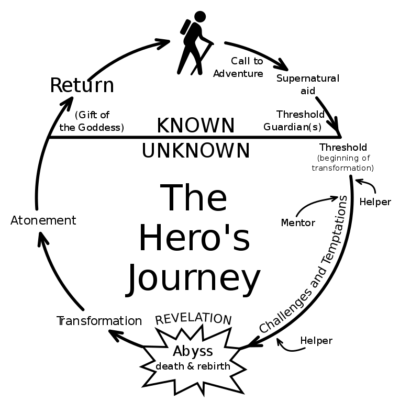There has been a lot of talk about the idea of “Toxic Masculinity” lately and it has truly hit the mainstream with the release of the now (in)famous Gillette ad. Though I have thoughts on the ad and public reaction to it, that’s not really what I’m going to address that here because the bigger story around this is the ideas, controversy, and issues that it brought up. If Michael A. Singer is right in his book The Untethered Soul, and “Inner sensitivity is a product of non-well being”, then the reaction to this must mean we have some “non-well being” to address. And maybe that’s really what we can get from this.
I can’t say I think that the term “toxic masculinity” is good or bad for the dialogue. It has certainly hit enough nerves that we’re talking about the negatives and positives of manhood — and that’s a good thing. But generally, I’m not a fan of using “masculine” a term specifically for “men.” I understand the idea of bifurcating tendencies but to say, for example, that “courage” is masculine and “sensitivity” is feminine, and then to ascribe those to men and women, ultimately negates the honest experiences of the literally billions of men who are also sensitive and the billions of women who are also courageous.
That said, I’m surprised at the the reaction from many men at the concept that men have major issues to overcome as men, since we so clearly relate to hero stories (see every Superhero blockbuster). We love these stories — where the hero has to overcome his own shortcomings and inner demons while battling outer demons in order to claim victory.This is also why I find the idea of “toxic masculinity” one worth exploring. The mark of a hero is the one who can turn his poison into his medicine, his weaknesses into his strengths. You see, the term is not “venomous masculinity,” it’s “toxic”. Venom hurts the other. Snake are venomous, but not toxic. You can eat snake (I know, I’ve done it) and you’re fine. It it bites you, and that’s a whole different story.
In this conversation, what we’re talking about hurts us all. The great misconception in this conversation is that the way men can be when exhibiting these “toxic” behaviors is venomous. Yes, men hurt others, but we haven’t cornered the market on cruelty. “Toxic masculinity,” however, hurts everyone, men and women alike.
To recognize that many traits that we, as men, have been taught by society and millennia of tradition, are harmful DOES NOT discount all the amazing things that we do, or traditions that we carry on — or new ways of being that we have developed on our own AS men. We don’t need to focus on what we’re already great at and say, “yeah, but all the great stuff!” If you were watching your favorite Super Hero movie and the hero already did everything right at the beginning, there would be no movie. You’d watch for five minutes and it would be over. But the hero is flawed and we, as men, are in this incredible Hero’s Journey with our flaws. We have toxins that we must turn into our medicine. We have flaws we must turn into our strengths.
And that’s why I’m surprised at much of the negative reaction to the Gillette commercial. It was about men showing some of the toxic sides of male behavior and then MEN stepping in to be the hero and to save the day! That’s what almost every Super Hero movie is about, too. Some bad guy, exhibiting toxic behavior, and then another man (aka the Hero) comes along, overcomes his weaknesses and saves the day.
As I see it, the downside of that commercial is that it was belabored, on the nose and a bit boring. But we can take that lesson and change the story. And the best place to start is in our own story. Because that isn’t boring. It’s our story, it’s our Hero’s Journey. Let’s take our toxins and make them our strengths. That’s what will make us heroes. Let’s not deny that we, like every hero in his story, have to tackle our flaws to win.
What are your questions? I encourage you to not post opinions, but post what questions this elicits. We all have thoughts, and we all have a point, as equally as we’re all missing part of the picture. And the internet is full of those opinions. But in the questions we may actually open to something we didn’t think of, or know, before.